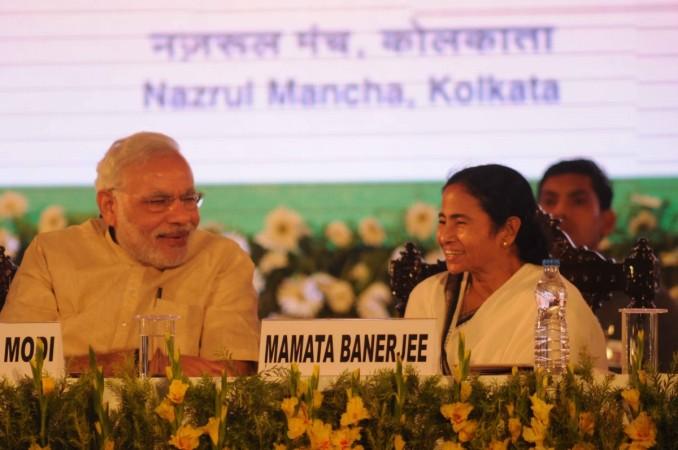
A decade before India attained Independence, the Congress party was witness to a clash of personalities between two iconic leaders – Mahatma Gandhi and Subhash Chandra Bose — and it was the Mahatma who eventually prevailed. The latter's defeat is something that the Bengalis take to heart even to this day. Gandhi and Jawaharlal Nehru, who succeeded as the former's political successor, have still not been forgiven by them for 'conspiring' against their hero and 'pushing' him into oblivion.
Fast forward to 2017. Indian politics is yet again witness to a duel between two leaders from the respective states of Gandhi and Bose. Yes, we are talking about Prime Minister Narendra Modi and the Chief Minister of West Bengal, Mamata Banerjee. Even though the latter had been part of the National Democratic Alliance (NDA) led by the BJP when Atal Bihari Vajpayee was at the helm, she has never had good political relations with Modi.
Modi vs Mamata battle has intensified over chit-fund scams and elections
During the 2014 general elections, which Modi's party won overwhelmingly, and the 2016 state elections in West Bengal, which Mamata won for her TMC single-handedly, the clash was more political, thanks to chit-fund scams, sting operations and the BJP's rise in the TMC's territory. Post elections, the confrontation has intensified over issues like demonetisation and arrest of TMC MPs accused in Rose Valley chit-fund scam.
The TMC supremo found the demonetisation issue a perfect opportunity to look beyond West Bengal but can she really reverse the story that had unfolded for Netaji eight decades ago?
The common feeling is that she cannot. The reason is not that Mamata is politically weak. Although a regional leader, she happens to be one of those rare mass politicians in the country who made it to the top single-handedly.
Unlike most other women leaders in India, Mamata is one who did not have any godfather to help her get political mileage. Yes, former prime minister Rajiv Gandhi was her mentor once but after his premature death, the mercurial 'daughter of fire', as the TMC leader is often called, did it all – from pulling out of the Congress and floating her own TMC and eventually toppling a 34-year-old Left Front regime to come to power – by herself. So, despite her maverick nature, Mamata Banerjee just cannot be counted off when it comes to leadership qualities.
Just like her, Subhash Chandra Bose couldn't be ignored as a brave leader who also represented a province (Bengal) that played a prominent role in the Independence movement. But yet, he had an irreversible clash with Gandhi, which saw him facing the consequences of getting expelled from the Congress.
Leaders from Bengal are known for their non-conformist stands
Irrespective of what the Bengalis think, one cannot ignore the fact that Netaji fell short of dealing with Gandhi because of his non-conformist ways. Like a typical Bengali gentleman, he did not have the will to understand the 'trader's acumen' that the Gujarati Mahatma had. On the other hand, Mahatma's loyalists were not happy with Bose's method of working, which they thought was messy. That's precisely why Bose's conflicts with Gandhi intensified after he became the president of the grand-old party at the Haripura session in 1938.
Bose and Gandhi's thoughts never matched
The thought process of the two never got aligned either. Bose, educated at Cambridge, was a man who believed in revolutionary ways while Gandhi, as we all know, was a man who believed in non-violent ways of protest. As Nirad Chaudhari said, the Bengali Hindus belonged to two schools – the Saktas who worshipped the power in Mother Goddess, and the Vaishnavas who believed in non-violence. The higher Bengali castes that were a force behind nationalism were mostly Saktas and looked down on the Vaishnavas, for their belief in non-violence and identity as traders. The fact that Gandhi was a Vaishnava and Bose was a Sakta made the polarisation inevitable.
Bose's method wasn't the favour of the day
Bose's method of fighting the freedom struggle was perhaps another limitation he had in those days. Finding little help, Bose had taken the Kautilyan route of joining hands with the enemy's enemy. i.e., the Axis Powers, to defeat the British during the Second World War. It was not just a strategic miscalculation, it also did not strike a chord with the conformist minds of the freedom fighters who were educated in the West and influenced more by democratic and not fascist lessons. The experience under Gandhi had taught Indians to be peaceful protesters, something which Bose's ideas found difficult to replace.
Mamata Banerjee, too, has similar challenges. Though not educated in the West or having a difference over religious conviction, the TMC leader still ended up locking horns with Modi because she has a similarity with Bose and that is about the same non-conformity — the cynicism about the opponent's ability.
Mamata could have protested over demonetisation in a more organised way
Banerjee rightly found an opportunity to protest against Modi's demonetisation but she could have penned her script in a more thoughtful way – something which Bihar CM Nitish Kumar has been doing to beat Modi in the long run. Maybe Mamata's limited experience as an administrator and her bigger conviction in the 'never compromise' ideology (militant Leftism is something that comes easily to the Bengali mind) made her look too hasty on the national stage. These could also derail her ambition to win the Delhi throne.
It is important to give the enemy its due respect if one intends to emerge the winner. Both Bose and Mamata erred in learning the lesson. While Gandhi had the last laugh against Bose, it looks very likely that Modi, too, will eclipse Mamata in their duel.












